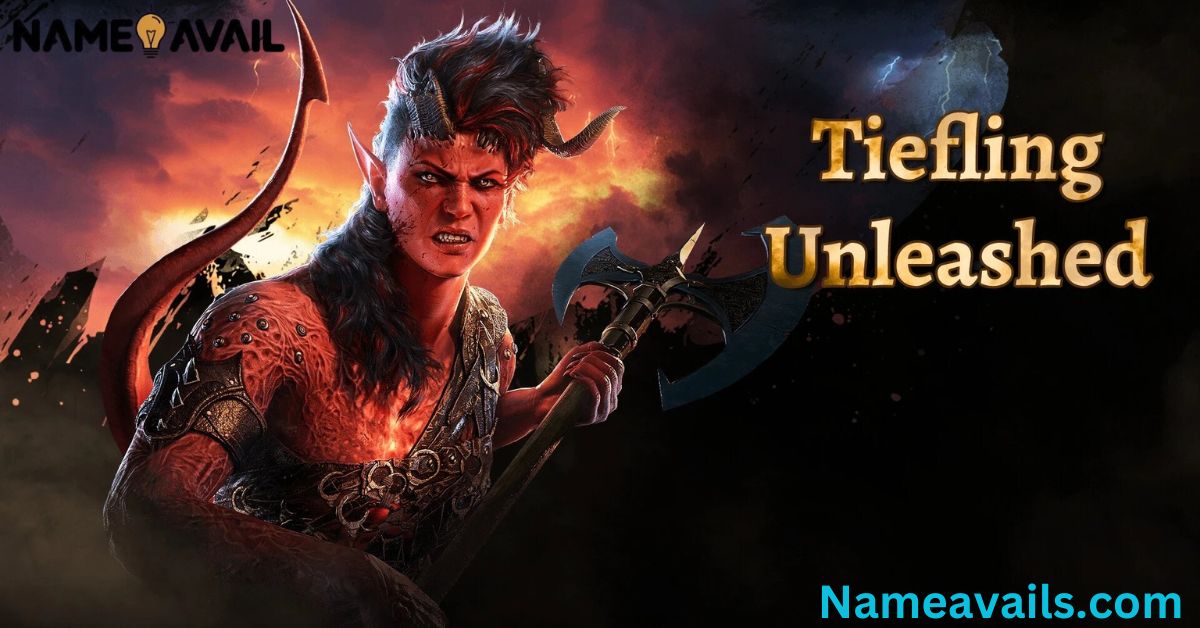Tieflings are a unique fantasy race found in role-playing games like Dungeons & Dragons. They are known for their infernal heritage, often with demonic or devilish ancestors. This background gives them striking features, like horns and tails, and mystical powers.
Imagine playing a character with mysterious powers and a haunting past. Tieflings stand out in any story or game with their otherworldly looks and complex nature. They add depth, mystery, and excitement to the fantasy world, making them fan favorites.
Tiefling names are as unique as the characters themselves. These names often reflect their dark ancestry and magical aura. Some names come from ancient languages, while others hint at traits or ideals. These names help build a Tiefling’s personality and backstory.
How to Choose Tiefling Names?
Choosing the best Tiefling name is an exciting part of building your character’s identity. A well-chosen name reflects their mysterious nature, infernal ancestry, and personal traits. Here are a few tips to help you find the perfect Tiefling name:
- Consider Heritage: Tiefling names often have dark, mystical sounds to reflect their fiendish lineage. Names inspired by ancient languages or fantasy worlds work well.
- Reflect Personality: Pick a name that hints at your character’s personality, like fierce, wise, or cunning. This helps bring depth to their story.
- Think of Unique Traits: Tieflings often have distinct physical features. Names that reflect these unique traits, like “Ember” for a fiery nature, can be memorable.
Tiefling Virtue Names
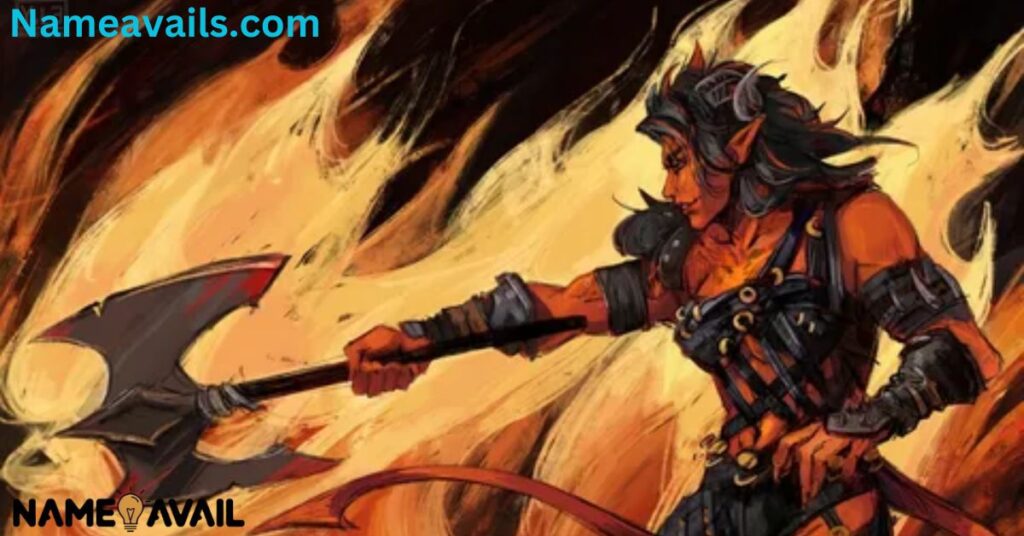
Tiefling virtue names are unique names that embody a character’s values, ideals, or aspirations. Unlike traditional names, these infernal names reflect traits such as “Hope,” “Valor,” or “Fury.” Using virtue names gives a Tiefling’s identity a strong purpose, adding meaning to their backstory. These names resonate deeply with their infernal heritage, making them powerful for D&D Tieflings and other fantasy settings.
- Aegis: “Protection” – Symbolizes a guardian role.
- Ardor: “Passionate zeal” – Represents fiery enthusiasm.
- Balance: “Equilibrium” – Embodies a desire for stability.
- Bliss: “Happiness” – Reflects pure joy and serenity.
- Brilliance: “Intellect” – Stands for exceptional wisdom or insight.
- Calm: “Tranquility” – Suggests inner peace and control.
- Charity: “Generosity” – Symbolizes selfless giving.
- Courage: “Bravery” – Embodies fearlessness.
- Destiny: “Fate” – Represents a sense of purpose or fate.
- Echo: “Resonance” – Implies an impact that endures.
- Felicity: “Happiness” – Reflects bliss and joy.
- Fortitude: “Strength in adversity” – Embodies resilience.
- Glory: “Honor” – Reflects fame or noble deeds.
- Harmony: “Unity” – Embodies peace and balance.
- Honor: “Integrity” – Reflects a commitment to moral principles.
- Hope: “Optimism” – Represents an unwavering belief in the future.
- Insight: “Perception” – Reflects deep understanding or wisdom.
- Joy: “Happiness” – Embodies a cheerful, bright disposition.
- Justice: “Fairness” – Represents truth and righteousness.
- Liberty: “Freedom” – Reflects independence and choice.
- Lucidity: “Clarity” – Symbolizes clear thinking and understanding.
- Mercy: “Compassion” – Reflects kindness in judgment.
- Patience: “Endurance” – Embodies resilience and persistence.
- Resolve: “Determination” – Represents a firm commitment.
- Reverence: “Deep respect” – Reflects honor and dignity.
- Serenity: “Peacefulness” – Symbolizes calm and tranquility.
- Valor: “Bravery” – Reflects courage in danger.
- Vigil: “Watchfulness” – Embodies protective care.
- Virtue: “Moral excellence” – Represents a standard of goodness.
- Wisdom: “Insight” – Reflects experience and deep knowledge.
Tiefling Names BG3
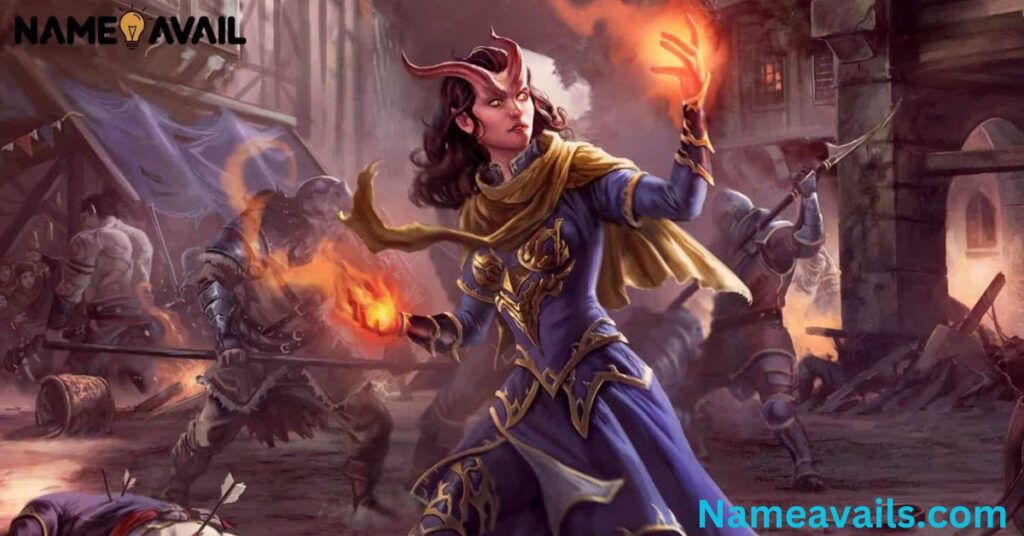
In Baldur’s Gate 3 (BG3), Tiefling names are carefully chosen to capture their dark, mystical lineage. BG3 Tiefling names reflect their infernal background while providing hints about their personality or role in the game. Players can select from a range of names, including virtue names, to fit their character’s alignment and strengths. This adds depth to their journey and connections with others.
- Alfira: A wandering bard known for her gentleness, yet her music evokes powerful emotions.
- Arabella: A young and courageous Tiefling girl often associated with a strong heart and a protective nature.
- Asmodeous: Named after the Lord of the Nine Hells, this Tiefling epitomizes infernal lineage and fiery resistance.
- Balorath: Inspired by powerful demons, symbolizing immense strength and a fierce nature.
- Cerys: Known for her mysterious charm, often linked to lore and supernatural knowledge.
- Dammon: A skilled blacksmith, representing strength, craftsmanship, and resilience.
- Draxus: Associated with dark, mystical knowledge and often linked to shadowy powers.
- Enkiel: Embraces the chaotic forces, known for destructive and unpredictable tendencies.
- Fiernia: Named after a demon princess ruling fiery pits; evokes fiery resilience and command over flame.
- Graz’zt: Draws on the cunning and hedonism of the demon lord, known for tempting mortals.
- Haluk: The embodiment of ferocity and wild instincts, reminiscent of the hunt.
- Iblia: Tied to desert winds and scorching sandstorms, representing an arid and intense presence.
- Jorvik: A name resonant with warrior qualities, symbolizing military prowess and strategy.
- Karlach: A battle-hardened warrior known for her burning spirit and intense loyalty.
- Kessia: Linked to the shadows, embodying stealth, mystery, and darkness.
- Lakrissa: A Tiefling merchant with persuasive charm, known for her ability to negotiate and adapt.
- Lethia: Known for her connection to nightmares, invoking fear and nocturnal magic.
- Mol: A young Tiefling child who survives by her wit and quick thinking in the city streets.
- Nocturne: Signifies the night and mystical connections, embodying serenity and shadow.
- Obox-ob: A name rooted in vermin control, representing command over lesser beings.
- Orpheus: Associated with music and charm, though shrouded in tragedy and allure.
- Pazuzu: Tied to stormy skies, symbolizing control over winds and weather.
- Rolan: A sorcerer known for his arcane abilities, driven by a thirst for power and knowledge.
- Samael: Evokes destruction and ruination, often tied to death and infernal power.
- The Warden: An ominous figure tied to judgment and watchfulness, embodying strictness.
- Urthor: Linked to decay, representing corruption and the passage of time.
- Vassik: Associated with stealth, representing a shadowy, elusive character.
- Xul: A necromantic force, tied to the control of the undead and dark powers.
- Yawingfang: Refers to dangerous fangs and an aggressive bite, symbolizing a fierce defender.
- Zevlor: A former Hellrider, known for his loyalty, bravery, and determination to protect his people.
ALSO READ : White Dragon Names
Female Tiefling Names
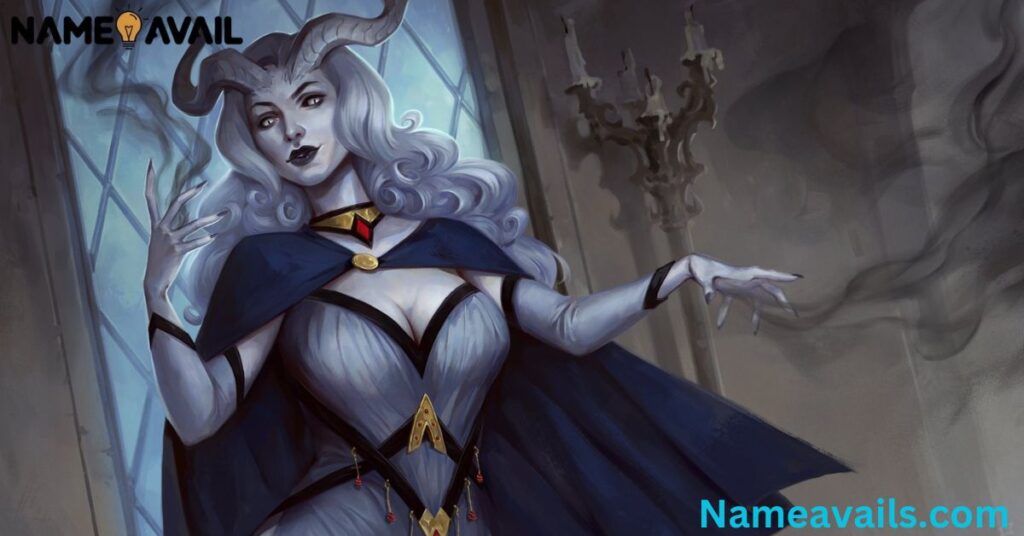
Female Tiefling names are usually elegant yet dark, embodying their unique heritage. Examples like “Lyra,” “Nyx,” or “Ember” capture their charm and mystery. Choosing Tiefling female names that match their traits, whether graceful, fierce, or cunning, gives depth to the character. Many players find these names enhance the role-playing experience, especially in D&D campaigns and similar fantasy games.
- Aeliana: “Sun goddess” – Reflects warmth and radiant charisma.
- Aisling: “Dream vision” – Mysterious, often associated with prophecy.
- Althea: “Healing” – Connected to herbal lore and restorative magic.
- Astra: “Stars” – Celestial, often linked to destiny and navigation.
- Azael: “Strong” – Represents inner resilience and power.
- Briony: “To sprout” – Symbolizes growth, new beginnings, and resilience.
- Calista: “Most beautiful” – Known for allure, often charms others effortlessly.
- Caia: “To rejoice” – Cheerful, bringing light and positivity to her surroundings.
- Cyra: “Sun goddess” – Radiant, embodying light and warmth.
- Daelia: “Unknown” – Mysterious, often perceived as enigmatic.
- Eira: “Snow” – Calm and serene, connected to frost and winter themes.
- Elysia: “Blissful” – Embodies peace, often associated with otherworldly realms.
- Elara: “Bright” – Illuminating presence, often a guiding force.
- Ember: “Smoldering fire” – Passionate, a fierce spirit tied to flame magic.
- Inferna: “Fire” – Fiery personality, known for her explosive temper and energy.
- Isara: “Unknown” – Holds an aura of mystery and often keeps secrets.
- Kiera: “Dark-haired” – Mysterious, often a keeper of hidden knowledge.
- Lunara: “Moonlit” – Connected to the night, embodying grace and intuition.
- Maris: “Of the sea” – Tied to ocean lore, reflecting calm yet deep emotions.
- Morgana: “Sea-born” – Evokes power and mystery, associated with sea enchantment.
- Myst: “Enigmatic” – Cloaked in mystery, known for her elusive nature.
- Nerida: “Sea nymph” – Associated with water, graceful and fluid in movement.
- Onyx: “Dark gemstone” – Strong-willed, symbolizing durability and allure.
- Quill: “Feathered pen” – Intelligent, often a historian or scribe.
- Rhiannon: “Great queen” – Regal, associated with leadership and wisdom.
- Selara: “Unknown” – Elusive, holds an otherworldly charm and mystery.
- Seraphina: “Fiery angel” – Passionate and protective, a fierce defender.
- Shade: “Shadowed” – Connected to darkness, skilled in stealth and secrecy.
- Solara: “Sun” – Bright and inspiring, often seen as a source of energy.
- Talia: “Dew of heaven” – Gentle and nurturing, tied to nature and renewal.
- Thalassa: “Sea goddess” – Powerful, embodying the boundless strength of the ocean.
- Uma: “Light” – Radiant, often brings warmth and positivity to those around her.
- Vespera: “Evening star” – Poised and graceful, often tied to twilight and mystery.
- Wren: “Small bird” – Agile and nimble, often acts as a messenger or scout.
- Xanthe: “Golden” – Shines brightly, associated with fortune and warmth.
- Yara: “Small butterfly” – Delicate and graceful, embodying freedom and transformation.
- Zara: “Princess” – Regal, carries herself with a sense of authority and grace.
Male Tiefling Names
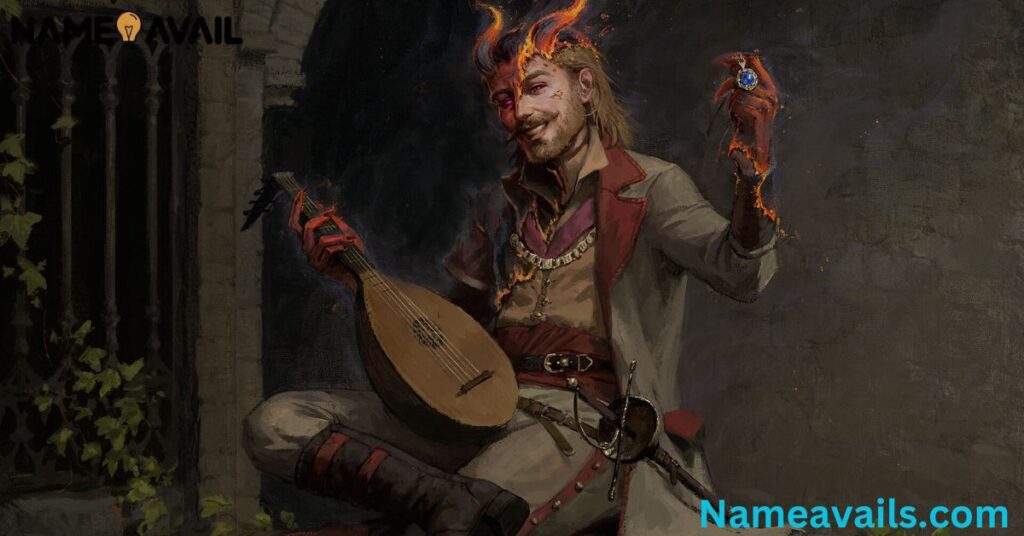
Male Tiefling names are strong and often have a haunting quality. Names like “Acheron,” “Dante,” or “Thorne” reflect their infernal roots and intense nature. Male Tiefling names carry a sense of power and mystery, fitting the dark lineage these characters possess. Choosing these names can emphasize a Tiefling’s personality and role, whether in D&D or other fantasy adventures.
- Akmenos: “Steadfast soul,” embodying resilience and loyalty.
- Alistair: “Defender,” symbolizing a protective and noble spirit.
- Auron: “Dawn,” evoking new beginnings and hope.
- Blight: Represents decay and ruin, suggesting a dark, impactful presence.
- Brax: Unknown origin, but often linked to strength and unpredictability.
- Caden: “Companion,” reflecting loyalty and friendliness.
- Cedric: “Kindly,” associated with warmth and approachability.
- Coal: Named for endurance and the ability to withstand pressure.
- Creed: Reflects a strong set of principles, often guiding his decisions.
- Damakos: “Wounded spirit,” highlighting depth and inner struggles.
- Darian: “Gift,” known for being helpful and generous.
- Dorian: “Gift,” symbolizing a charming and warm personality.
- Drystan: “Sad,” with a melancholic undertone, carrying a mysterious aura.
- Dust: Represents transience and acceptance of impermanence.
- Eamon: “Wealthy protector,” suggesting a nurturing and prosperous nature.
- Fenris: “Wolf,” indicating loyalty and a wild side.
- Garon: “Guardian,” a protector with a strong, unwavering presence.
- Gideon: “Hewer,” known for strength and perseverance.
- Grevin: Unknown origin, with an enigmatic and cautious nature.
- Grim: Serious, possibly haunted, suggesting a somber history.
- Halix: Unknown, but often portrayed as wise and enigmatic.
- Icarus: “Glider,” implying freedom and a yearning to explore.
- Iron: Symbolizes unbreakable will and strength.
- Jarek: “Strong,” renowned for resilience and power.
- Kaelus: Unknown, often linked to mystery and subtlety.
- Kohl: Named after a dark powder, symbolizing allure and subtle danger.
- Lorian: Unknown, adding to a mysterious and distant aura.
- Lucian: “Light,” often a beacon of wisdom and understanding.
- Lysander: “Liberator,” represents freedom and justice.
- Malachi: “Messenger,” carrying news or change with a mystical edge.
- Marik: Unknown, associated with creativity and unpredictability.
- Maelstrom: Represents a chaotic force, filled with power and passion.
- Nox: “Night,” mysterious and associated with shadowy magic.
- Ozias: “Salvation,” often a healer or guide to others.
- Phantom: Elusive and ghostly, known for stealth and mystery.
- Pierce: Known for his perceptive mind, able to unveil hidden truths.
- Pyrrhus: “Flame,” with a bold, fiery temperament.
- Quillan: “Cub,” suggesting a youthful, fierce spirit.
- Ragnar: “Warrior,” renowned for courage and battle prowess.
- Rafe: “Wolf counsel,” wise and strategic.
- Raven: Named after the bird, embodying intelligence and mystique.
- Revenant: Represents a relentless return, often driven by unfinished business.
- Slate: Represents a new beginning, offering a clean slate.
- Smoke: Mysterious and elusive, adept at concealing intentions.
- Talon: Known for sharp instincts and agility, especially in battle.
- Vale: Suggests hidden depths, evoking a sense of mystery.
- Valen: “Strong,” grounded in strength and reliability.
- Void: Reflects a deep, consuming nature, often enigmatic.
Which Tiefling should I Play?
Selecting the right Tiefling depends on your playstyle and class preference. For magic users, the Infernal Tiefling’s Charisma boost suits Sorcerers, Warlocks, and Bards well, offering powerful spell options. Melee-focused players might prefer the Zariel Tiefling, as it grants Strength bonuses and fiery abilities that align with Paladins and Fighters. Alternatively, Feral Tieflings add Dexterity and Intelligence, making them excellent Rogues and Wizards, ideal for stealthy or intellectual builds.
Tiefling Last Names
Tiefling last names, or surnames, add an extra layer of identity to these infernal characters. These names often reflect family legacy or infernal lineage, like “Shadowfire” or “Bloodthorne.” A Tiefling last name can reveal family traits, enhance a Tiefling’s aura, and deepen their story. In games like D&D, these surnames contribute to world-building, helping players connect with their characters.
- Ashenwood: “Gray tree”; represents a quiet strength and endurance.
- Blackthorn: “Thorny”; symbolizes resilience and strength in adversity.
- Bloodmoon: “Red moon”; represents ominous power, often linked with fate or vengeance.
- Criella: “Eternal flame”; an infernal name, reflecting endless strength and burning resolve.
- Darkflame: “Shadow fire”; evokes mystery and a fierce, hidden intensity.
- Darkraven: “Black bird”; associated with stealth and wisdom from infernal or mysterious origins.
- Duskwraith: “Twilight ghost”; embodies an elusive nature, blending darkness with ethereal grace.
- Emberfall: “Falling fire”; indicates passion or a transformative, fiery spirit.
- Emberstone: “Fiery rock”; combines strength with a fierce, burning spirit.
- Firebrand: “Flame bearer”; represents a fiery personality, often seen as a leader or instigator.
- Frostborn: “Born cold”; implies resilience, often unaffected by hardship.
- Froststrike: “Cold hit”; symbolizes calculated, sharp, and powerful action.
- Frostveil: “Cold cover”; signifies a reserved nature, with power hidden beneath the surface.
- Grimshadow: “Serious shade”; known for a quiet but powerful presence.
- Grimspire: “Grim peak”; suggests ambition tempered with caution.
- Grimstrike: “Serious hit”; indicates one who strikes precisely and powerfully.
- Ironbane: “Metal destroyer”; represents intense strength, known to break boundaries.
- Ironclaw: “Strong grip”; known for resilience and tenacity.
- Ironheart: “Strong heart”; signifies unwavering bravery and loyalty.
- Kairon: “Eternal flame”; of infernal descent, reflecting lasting strength and resilience.
- Lerissa: “Whispered charm”; of infernal origin, represents allure and subtle influence.
- Moonshadow: “Lunar darkness”; symbolizes a connection with secrets and the night.
- Nightshade: “Poisonous”; implies an enticing yet dangerous nature.
- Nightstorm: “Dark tempest”; represents tumultuous energy hidden in calm appearances.
- Orianna: “Golden dawn”; a tiefling of infernal origin, symbolizing hope and new beginnings.
- Ravenshadow: “Darkened”; often seen as mysterious and connected with hidden wisdom.
- Shadowrend: “Tear shadow”; implies someone capable of confronting and breaking through darkness.
- Silverfang: “Metallic tooth”; known for ferocity and a fierce, metallic strength.
- Starfire: “Celestial flame”; evokes cosmic strength, often seen as a guiding light.
- Stormbringer: “Storm bringer”; associated with tempestuous, dynamic energy.
- Stormrage: “Furious storm”; signifies unbridled, intense emotion and power.
- Thornheart: “Heart of thorns”; represents a balance of resilience and vulnerability.
- Thunderclap: “Thunder”; indicates raw power and the ability to command attention.
- Voidwalker: “Space traveler”; represents someone on a journey through the unknown, unbound by fear.
ALSO READ : Siren Names
D&D Tiefling Names
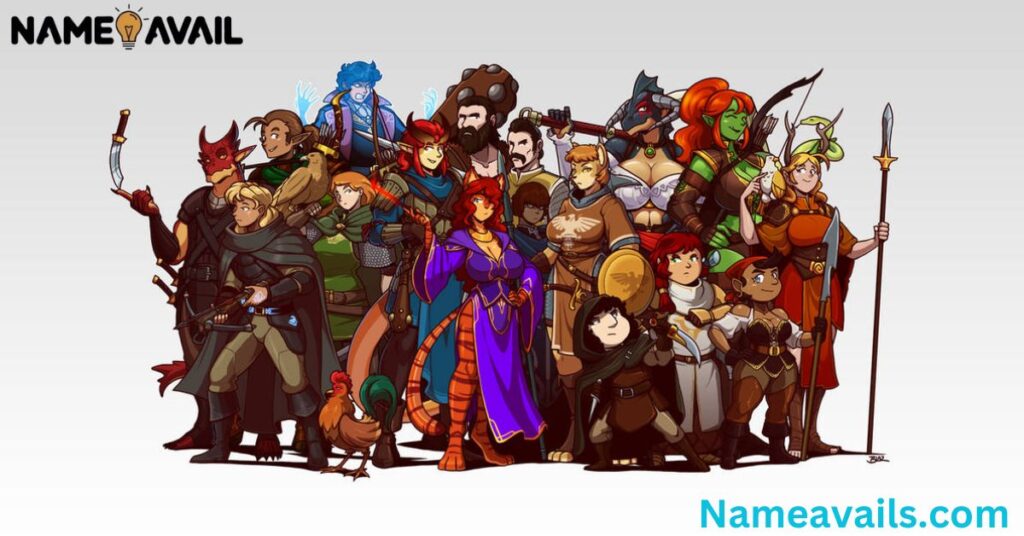
D&D Tiefling names draw inspiration from infernal origins and dark fantasy. They often carry unique sounds that hint at the Tiefling’s mysterious background, with names like “Zariel” or “Mephistopheles.” These names help establish a character’s connection to the infernal realms, making them more memorable and immersive for players. Good D&D Tiefling names are essential for crafting a compelling character.
- Aelar: “Unknown”; mystical, often associated with the unknown or arcane knowledge.
- Asha: “Hope”; virtue name symbolizing aspiration and resilience, common among Tieflings seeking a positive identity.
- Balthazar: “King’s treasure”; associated with wealth and power, often linked to royal or noble lineages.
- Bryndor: “Unknown”; mysterious, could imply hidden strength or ancestral knowledge.
- Caius: “Rejoice”; evokes a celebratory spirit, often chosen by Tieflings with a joyous or hopeful outlook.
- Cressida: “Gold”; symbolizing prosperity and beauty, common among Tieflings from affluent regions.
- Daelis: “Unknown”; an enigmatic name, hinting at hidden potential or latent powers.
- Drusilla: “Strong”; representing fortitude and resilience, often seen in warriors or defenders.
- Elowen: “Elm tree”; nature-based, linked to durability and growth, especially among Tieflings close to nature.
- Eryx: “Unknown”; a name of mystery, often chosen by Tieflings with connections to shadow or concealment.
- Esme: “Loved”; endearing and gentle, frequently associated with compassion and kindness.
- Faye: “Fairy”; often connected to otherworldly beauty or charm, symbolizing magic and allure.
- Halion: “Unknown”; a name associated with secrets and hidden knowledge.
- Helia: “Sun”; represents light and warmth, often chosen by Tieflings who cherish optimism or illumination.
- Isolde: “Ice ruler”; symbolizes control and composure, a popular name for Tieflings with a cool or calculating nature.
- Jareth: “Unknown”; mysterious in origin, often representing curiosity or intellect.
- Kilrakas: “Unknown”; embodies strength and determination, often a warrior’s name.
- Marius: “Male”; traditional and simple, sometimes used by Tieflings embracing human heritage.
- Niamh: “Bright”; reflects clarity and intelligence, popular among scholars and spellcasters.
- Orin: “Pale”; symbolizes mystery and might be associated with otherworldly origins.
- Pyrra: “Flame”; fiery and passionate, often chosen by Tieflings who embrace their infernal heritage.
- Quinn: “Wisdom”; represents intelligence and insight, valued by those pursuing knowledge.
- Roderic: “Famous ruler”; suggests leadership and valor, a name for influential Tieflings.
- Selene: “Moon Goddess”; celestial in nature, associated with grace, mystery, and lunar cycles.
- Skamos: “Unknown”; linked to cunning and skill, common among rogue Tieflings.
- Thyrakir: “Unknown”; an intense name hinting at power or hidden might (source: Codex Nomina).
- Ursa: “Bear”; symbolizes strength and protection, favored by guardians or defenders.
- Ulysses: “Wrathful”; implies fierceness and resilience, often chosen by Tieflings with a warrior spirit.
- Wren: “Bird”; delicate yet adaptable, symbolizing freedom or independence.
- Xylo: “Wood”; earthy and stable, popular among nature-affiliated Tieflings.
- Yara: “Butterfly”; symbolizes transformation and beauty, suitable for those embracing change.
- Yven: “Unknown”; a name shrouded in mystery, often representing wisdom or intrigue.
- Zander: “Defender”; signifies protection and bravery, often used by Tiefling warriors.
Why Are Tieflings So Popular with D&D Players?
Tieflings’ popularity stems from their rich lore, demonic lineage, and inherent conflict, making them complex, appealing anti-heroes. Their unique appearance, fire resistance, and high Charisma add role-playing depth and versatility, especially for social and combat situations. With various subraces offering distinct abilities, Tieflings allow players to experiment with diverse builds and playstyles, enhancing replay value and creativity in campaigns.
Cool Tiefling Names
Cool Tiefling names combine elements of mystery, strength, and allure. Names such as “Raven,” “Ember,” or “Abyss” feel modern while still honoring the Tiefling’s dark roots. Players look for cool Tiefling names to give their characters an edge, whether in D&D campaigns or video games like BG3. These names create lasting impressions, adding flair and personality to any Tiefling character.
- Abraxas: “Eternal fire”; rooted in mysticism, signifying strength.
- Asteroth: “Mighty warrior”; known in demonology, it evokes power.
- Axiom: “Principle”; denotes unwavering truth or lawfulness.
- Azura: “Sky blue”; evokes freedom and calm.
- Baalzebul: “Lord of the high place”; a classic infernal figure, signifying authority.
- Blade: “Sharp”; symbolizes precision and strength in battle.
- Blaze: “Flame”; intense and fiery, perfect for a fierce personality.
- Caim: “Defender”; one who protects or safeguards others.
- Calloused: “Hardened”; signifies resilience from hardship.
- Cinder: “Ashes”; representing rebirth and endurance through fire.
- Corvus: “Raven”; inspired by mystery and intelligence.
- Drax: “Unknown”; a name shrouded in enigma and strength.
- Echo: “Reverb”; subtle yet powerful presence.
- Ember: “Fire”; warm yet intense, a smoldering strength.
- Finnian: “Fair”; represents purity and honesty.
- Frost: “Cold”; icy and stoic, often an indicator of coolheadedness.
- Gryph: “Griffin”; symbolizes guardianship and ferocity.
- Jax: “Unknown”; edgy and mysterious, open to interpretation.
- Kaida: “Little dragon”; represents strength in a small frame.
- Kilrakas: “Iron will”; emphasizes resilience and unbreakable spirit.
- Lyth: “Unknown”; mysterious, with an adaptable quality.
- Lyric: “Song”; harmonious and charming, suited for a bard.
- Mammon: “Wealth”; a name reflecting prosperity or greed.
- Maverick: “Independent”; rebellious, with a disregard for norms.
- Nergal: “God of war”; symbolizes might and conflict.
- Orion: “Hunter”; a skilled and noble tracker, inspired by constellations.
- Pyra: “Fire”; a blazing, passionate personality.
- Raze: “Destroy”; embodies destruction and chaos.
- Ryker: “Brave”; denotes strength and courage.
- Sable: “Black”; sleek and enigmatic, often mysterious.
- Skaxik: “Fury”; embodies a fierce spirit and ruthless edge.
- Solace: “Comfort”; soothing presence, offering calm to allies.
- Talon: “Claw”; sharp, nimble, and lethal.
- Thorne: “Thorn”; symbolic of defense and resistance.
- Valac: “Wise”; a name associated with cunning and intellect.
- Vesper: “Evening star”; symbol of guidance and hope in darkness.
- Xander: “Defender”; a stalwart protector.
- Zagan: “Free spirit”; unconventional, breaking from tradition.
- Zane: “God’s gift”; blessed, with a sense of destiny.
- Zephyr: “Wind”; breezy and agile, a free-roaming spirit.
- Ziva: “Radiance”; represents vibrance and a bright personality.
ALSO READ : Phoenix Names
FAQs
What is a good name for a Tiefling?
A good Tiefling name captures their dark heritage and unique traits. Names like “Ember,” “Nyx,” and “Acheron” are popular choices, reflecting their mystical or infernal roots. Many players pick names that convey strength, mystery, or virtue to enhance their character’s identity.
How are tieflings named?
Tieflings are often named based on their infernal lineage, ideals, or personal traits. They may have virtue names like “Hope” or “Fury” or dark, ancient-sounding names. Many Tiefling names reflect their connection to infernal realms, giving them a distinct aura.
What race is best for Tiefling?
The Tiefling race itself is uniquely suited for characters with a mystical or dark background. However, Tieflings often align well with classes like Warlock, Bard, or Paladin. Their racial traits make them excellent choices for roles that value charisma, cunning, and magical abilities.
What are tieflings’ alternate names?
Alternate names for Tieflings often include virtue names like “Mercy” or “Valor,” or names inspired by infernal themes such as “Zariel” and “Mephistopheles.” These names reflect their heritage and add depth to their personalities, fitting into their unique fantasy world.
How rare are tieflings?
Tieflings are relatively rare in many fantasy worlds, making them intriguing and mysterious characters. Their infernal heritage and distinct appearance set them apart, often causing them to be viewed with curiosity or mistrust by other races.
What races don’t like tieflings?
In D&D lore, races like humans, elves, and dwarves may be wary or distrustful of Tieflings due to their infernal ancestry. This mistrust stems from their demonic traits, which can make Tieflings seem threatening to other races unfamiliar with their true nature.
Conclusion
Tiefling names play a big role in shaping the identity and story of a character. These names reflect their infernal heritage and can show a lot about their personality, traits, or role in the story. Whether you choose a strong, mysterious name or one that highlights a specific virtue, the right Tiefling name can bring your character to life in any game or story.
When selecting a name for a Tiefling, it is important to consider both their past and future. A good Tiefling name helps build a deeper connection with the character, making them memorable. By understanding Tiefling names and their meanings, you can create a more powerful and interesting character, adding value to your role-playing experience.

Helen Lisa is the admin of our platform dedicated to exploring the meanings and origins of names. With a deep interest in linguistics and culture, she curates insightful content to help users uncover the stories behind names. Helen’s expertise ensures a valuable and engaging experience for our audience.
